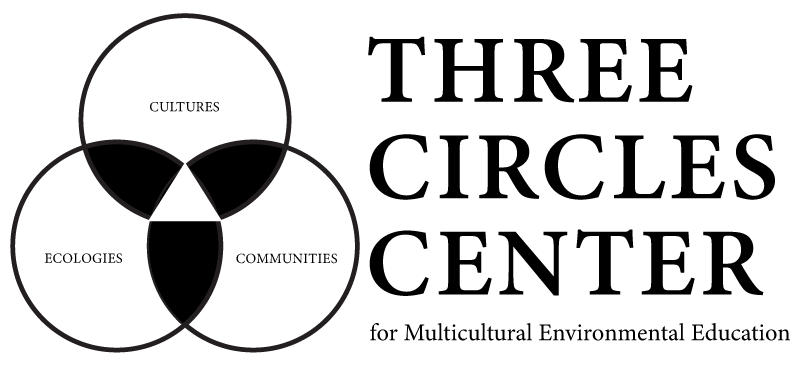
Three Circles develops curriculum embodying the Principles of Multicultural Environmental Education. The Cultural Watershed and the Ecotone Walk in the list below, are of our design. We also highlight curriculum examples from other programs and organizations that are aligned or exemplify those Principles. (Updated September 2023)
Education for Action and Action for Justice
- Multicultural Environmental Education critiques the ideologies and forces that oppress people and nature and seeks their transformation through research, imagination and action.
- Multicultural Environmental Education recognizes no contradiction between sound educational practices and the commitment of educators to environmental justice.
- Practitioners of Multicultural Environmental Education engage in self-reflection to understand the forces and influences that shape their cultures, race, politics, and points of view.
Acknowledging the Diversity of Students, Families and Communities
- In order to develop more inclusive program models, curricula and teaching strategies, Multicultural Environmental Education acknowledges that students, families and communities may have different needs for environmental education shaped by their community conditions, socio-economic status and cultural, racial and national backgrounds.
- Multicultural Environmental Education illuminates the idea that all cultures have relationships with their environments, from which they and others can look to for understanding and inspiration.
- Multicultural Environmental Education uses the teaching opportunity to assist students in becoming aware of, understanding, and valuing other cultures and their environmental experiences, expressions, and traditions.
Disproportionate Impacts on Health
- Multicultural Environmental Education recognizes that ecosystem health and the health of individuals and communities is inextricably linked. It recognizes that health in a polluted world is an environmental justice issue and that children are especially vulnerable to environmental threats.
Effective Meaningful Engagement
- Multicultural Environmental Education involves students, families, and communities directly and significantly in the development and implementation of programs, teaching practices and curricula. Such involvement is essential to achieving inclusivity and justice.
- Multicultural Environmental Education affirms that empowerment of communities and their social and economic development are essential and necessary goals of sustainable environmental quality, and that achievement of environmental literacy is a key step towards those goals.
Vision for a Culturally Diverse Planet
- Multicultural Environmental Education envisions a society at peace with nature and itself. Our work as educators is an essential catalyst for healing, inclusivity and justice.
- Multicultural Environmental Education takes a planetary perspective making connections between local, regional, national, and international environmental justice issues.

Comments are closed.